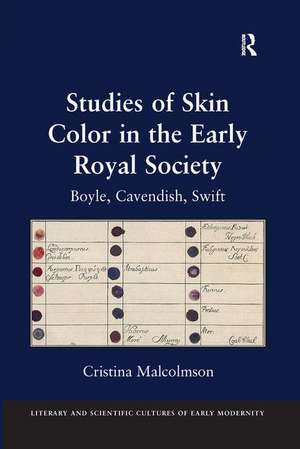Studies of Skin Color in the Early Royal Society: Boyle, Cavendish, Swift
Autor Cristina Malcolmsonen Limba Engleză Paperback – 9 sep 2016
| Toate formatele și edițiile | Preț | Express |
|---|---|---|
| Paperback (1) | 489.26 lei 6-8 săpt. | |
| Taylor & Francis – 9 sep 2016 | 489.26 lei 6-8 săpt. | |
| Hardback (1) | 1060.25 lei 6-8 săpt. | |
| Taylor & Francis – 15 aug 2013 | 1060.25 lei 6-8 săpt. |
Preț: 489.26 lei
Nou
Puncte Express: 734
Preț estimativ în valută:
93.64€ • 96.50$ • 79.06£
93.64€ • 96.50$ • 79.06£
Carte tipărită la comandă
Livrare economică 03-17 martie
Preluare comenzi: 021 569.72.76
Specificații
ISBN-13: 9781138269576
ISBN-10: 1138269573
Pagini: 248
Dimensiuni: 156 x 234 x 13 mm
Greutate: 0.45 kg
Ediția:1
Editura: Taylor & Francis
Colecția Routledge
Locul publicării:Oxford, United Kingdom
ISBN-10: 1138269573
Pagini: 248
Dimensiuni: 156 x 234 x 13 mm
Greutate: 0.45 kg
Ediția:1
Editura: Taylor & Francis
Colecția Routledge
Locul publicării:Oxford, United Kingdom
Notă biografică
Cristina Malcolmson is Professor of English at Bates College, USA.
Recenzii
PRIZE: Shortlisted for the British Society for Literature and Science Book Prize 2013
'... offers an original, nuanced, and deeply compelling investigation into the pre-history of modern understandings of race. ... Combining a meticulous attention to 17th century theories such as pre-Adamism and polygenesis with a careful regard to the institutional trappings of the new science, this study reveals how material practices, such as colonialism, gender politics and of course the brutalities of the slave trade, were bound up with the scientific practice of Boyle and others.' Patricia Cahill, Emory University, USA
'Studies of Skin Color is an impressive addition to Ashgate’s excellent "Literary and Scientific Cultures of Early Modernity" series, demonstrating in depth for the first time the significant connections between seventeenth- and eighteenth-century science, commerce, colonialism, and slavery; and, perhaps more importantly, the unique capacity of literary works to interrogate such bonds.' Greg Lynall, University of Liverpool for The British Society for Literature and Science
'I have already recommended this volume to colleagues working in the field of history of medicine and scientific biography, but would further commend it to historians of science, gender, race and early modernists more generally.' Jonathan Reinarz, Director of the History of Medicine Unit at the University of Birmingham, Centaurus: An International Journal of the History of Science and its Cultural Aspects
'This is a refreshingly diverse array of sources and interests ... a fascinating and critical look at Boyle and the Royal Society in the co-constitution of empiricism, colonialism, and race.' Sixteenth Century Journal
'Malcolmson's book is noteworthy for its clear argument, its excellent use of literary sources, its creative gender analysis, and its status as a metropolitan history in light of Atlantic studies. ... a variety of scholars will be interested in her work.' Seventeenth-Century
'... offers an original, nuanced, and deeply compelling investigation into the pre-history of modern understandings of race. ... Combining a meticulous attention to 17th century theories such as pre-Adamism and polygenesis with a careful regard to the institutional trappings of the new science, this study reveals how material practices, such as colonialism, gender politics and of course the brutalities of the slave trade, were bound up with the scientific practice of Boyle and others.' Patricia Cahill, Emory University, USA
'Studies of Skin Color is an impressive addition to Ashgate’s excellent "Literary and Scientific Cultures of Early Modernity" series, demonstrating in depth for the first time the significant connections between seventeenth- and eighteenth-century science, commerce, colonialism, and slavery; and, perhaps more importantly, the unique capacity of literary works to interrogate such bonds.' Greg Lynall, University of Liverpool for The British Society for Literature and Science
'I have already recommended this volume to colleagues working in the field of history of medicine and scientific biography, but would further commend it to historians of science, gender, race and early modernists more generally.' Jonathan Reinarz, Director of the History of Medicine Unit at the University of Birmingham, Centaurus: An International Journal of the History of Science and its Cultural Aspects
'This is a refreshingly diverse array of sources and interests ... a fascinating and critical look at Boyle and the Royal Society in the co-constitution of empiricism, colonialism, and race.' Sixteenth Century Journal
'Malcolmson's book is noteworthy for its clear argument, its excellent use of literary sources, its creative gender analysis, and its status as a metropolitan history in light of Atlantic studies. ... a variety of scholars will be interested in her work.' Seventeenth-Century
Cuprins
List of Illustrations, Acknowledgements, List of Abbreviations, Introduction, 1. Race and the Experimental Method in the Society, 2. Discussions of Race and the Emergence of Polygenesis in the Society, 3. Boyle, Biblical Monogenesis, and Slavery, 4. Race, Gender, and the Response to Boyle in Cavendish’s
Blazing World, 5. Race, Gender, and the Imagination in the Philosophical Transactions, 6. Gulliver’s Travels and Studies of Skin Color in the Society, Conclusion: The Royal Society and Atlantic Studies, Appendix: Jonathan Swift’s Debt to Margaret Cavendish, Bibliography, Index
Blazing World, 5. Race, Gender, and the Imagination in the Philosophical Transactions, 6. Gulliver’s Travels and Studies of Skin Color in the Society, Conclusion: The Royal Society and Atlantic Studies, Appendix: Jonathan Swift’s Debt to Margaret Cavendish, Bibliography, Index
Descriere
Arguing that the early Royal Society moved science toward racialization by giving skin color a new prominence as an object of experiment and observation, Cristina Malcolmson provides the first book-length examination of studies of skin color in the Society. She places the genre of the voyage to the moon in the context of early modern discourses about human difference, and argues that Cavendish’s Blazing World and Swift’s Gulliver’s Travels satirize the Society’s emphasis on skin color.
